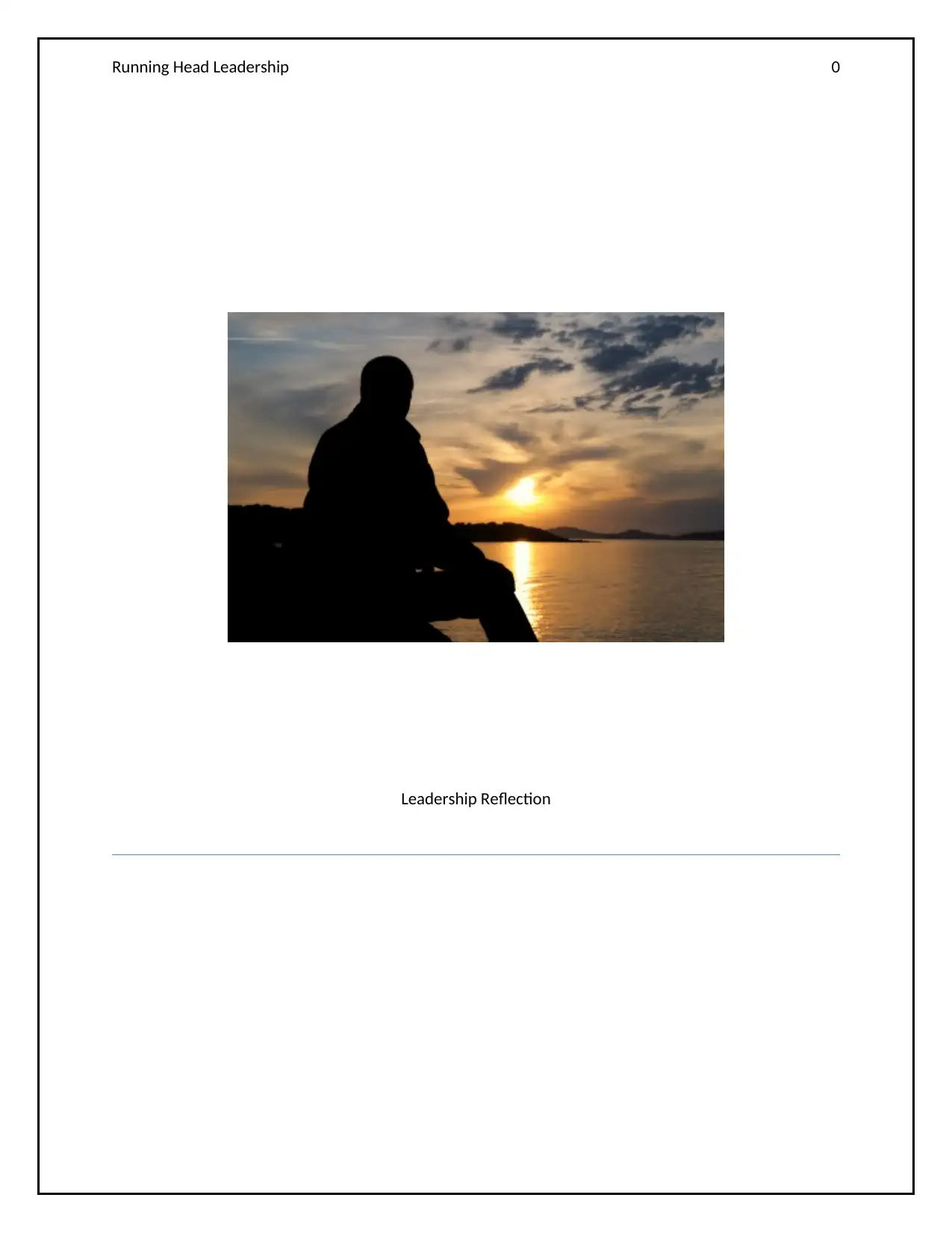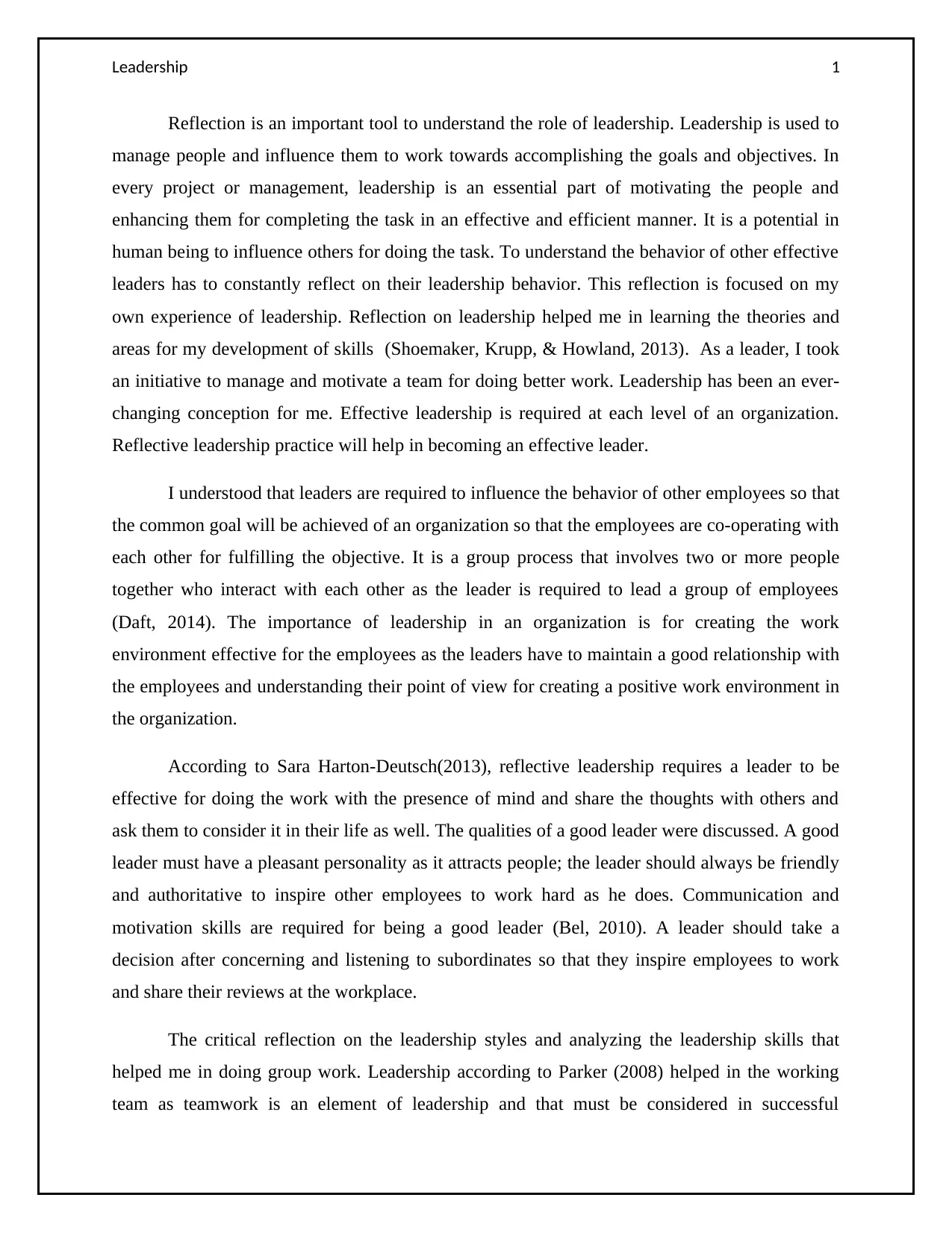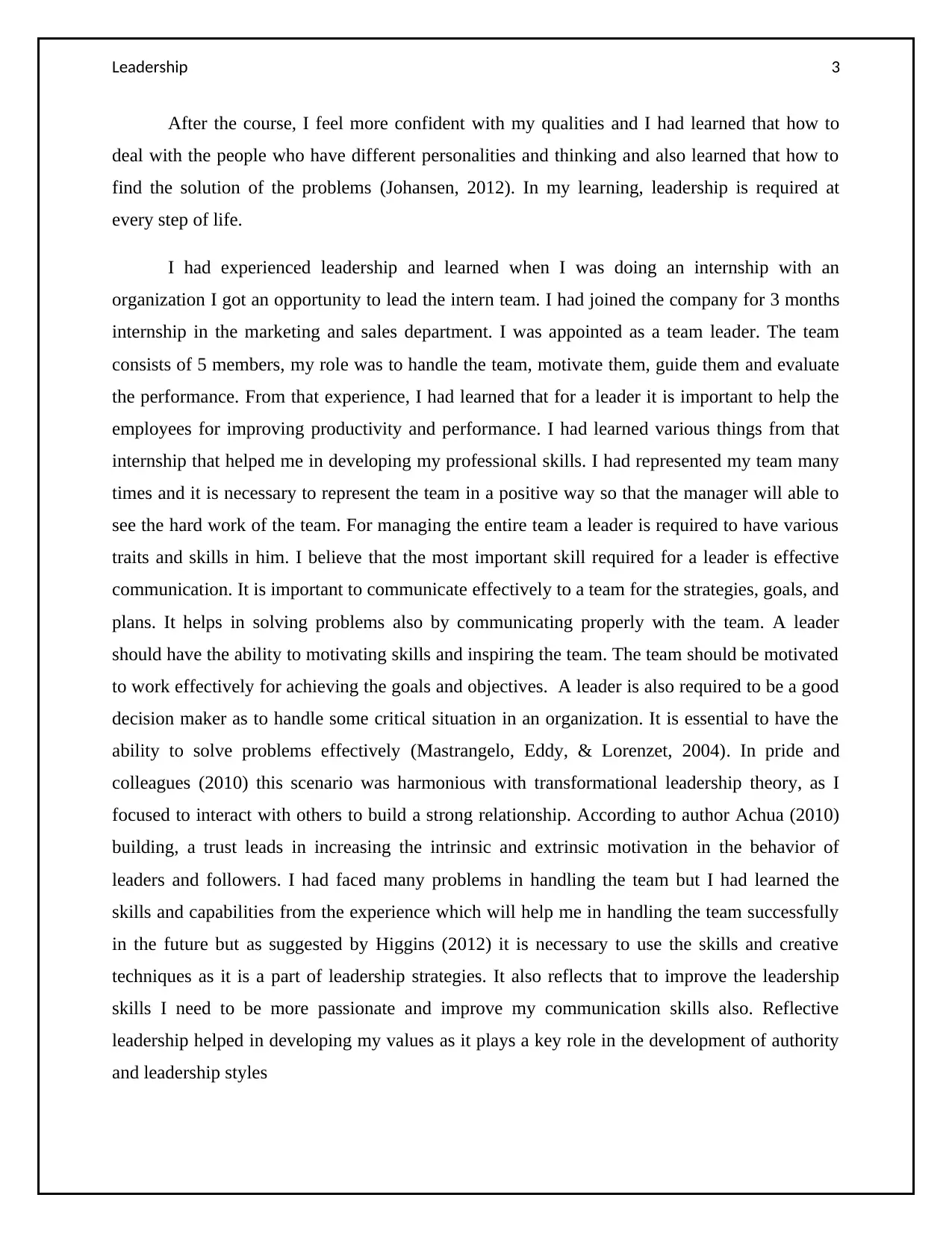BUMGT5970 Leadership Reflection Report: Semester 2
VerifiedAdded on 2023/04/04
|7
|1773
|413
Report
AI Summary
This report is a comprehensive reflection on leadership, analyzing the student's personal journey in understanding and developing leadership skills. The report explores various leadership theories, reflective practices, and the impact of class activities on the student's perception of leadership. It details the student's experience in managing and motivating a team, highlighting the importance of communication, decision-making, and interpersonal relationships. The report emphasizes the significance of reflective leadership in personal and professional development, including identifying strengths, weaknesses, and the application of leadership skills in different contexts. The student discusses transformational and democratic leadership styles, and emphasizes the importance of team building, problem-solving, and adaptability in achieving organizational goals. This reflective analysis provides insights into effective leadership practices and the continuous learning process required to become an impactful leader.

Running Head Leadership 0
Leadership Reflection
Leadership Reflection
Paraphrase This Document
Need a fresh take? Get an instant paraphrase of this document with our AI Paraphraser

Leadership 1
Reflection is an important tool to understand the role of leadership. Leadership is used to
manage people and influence them to work towards accomplishing the goals and objectives. In
every project or management, leadership is an essential part of motivating the people and
enhancing them for completing the task in an effective and efficient manner. It is a potential in
human being to influence others for doing the task. To understand the behavior of other effective
leaders has to constantly reflect on their leadership behavior. This reflection is focused on my
own experience of leadership. Reflection on leadership helped me in learning the theories and
areas for my development of skills (Shoemaker, Krupp, & Howland, 2013). As a leader, I took
an initiative to manage and motivate a team for doing better work. Leadership has been an ever-
changing conception for me. Effective leadership is required at each level of an organization.
Reflective leadership practice will help in becoming an effective leader.
I understood that leaders are required to influence the behavior of other employees so that
the common goal will be achieved of an organization so that the employees are co-operating with
each other for fulfilling the objective. It is a group process that involves two or more people
together who interact with each other as the leader is required to lead a group of employees
(Daft, 2014). The importance of leadership in an organization is for creating the work
environment effective for the employees as the leaders have to maintain a good relationship with
the employees and understanding their point of view for creating a positive work environment in
the organization.
According to Sara Harton-Deutsch(2013), reflective leadership requires a leader to be
effective for doing the work with the presence of mind and share the thoughts with others and
ask them to consider it in their life as well. The qualities of a good leader were discussed. A good
leader must have a pleasant personality as it attracts people; the leader should always be friendly
and authoritative to inspire other employees to work hard as he does. Communication and
motivation skills are required for being a good leader (Bel, 2010). A leader should take a
decision after concerning and listening to subordinates so that they inspire employees to work
and share their reviews at the workplace.
The critical reflection on the leadership styles and analyzing the leadership skills that
helped me in doing group work. Leadership according to Parker (2008) helped in the working
team as teamwork is an element of leadership and that must be considered in successful
Reflection is an important tool to understand the role of leadership. Leadership is used to
manage people and influence them to work towards accomplishing the goals and objectives. In
every project or management, leadership is an essential part of motivating the people and
enhancing them for completing the task in an effective and efficient manner. It is a potential in
human being to influence others for doing the task. To understand the behavior of other effective
leaders has to constantly reflect on their leadership behavior. This reflection is focused on my
own experience of leadership. Reflection on leadership helped me in learning the theories and
areas for my development of skills (Shoemaker, Krupp, & Howland, 2013). As a leader, I took
an initiative to manage and motivate a team for doing better work. Leadership has been an ever-
changing conception for me. Effective leadership is required at each level of an organization.
Reflective leadership practice will help in becoming an effective leader.
I understood that leaders are required to influence the behavior of other employees so that
the common goal will be achieved of an organization so that the employees are co-operating with
each other for fulfilling the objective. It is a group process that involves two or more people
together who interact with each other as the leader is required to lead a group of employees
(Daft, 2014). The importance of leadership in an organization is for creating the work
environment effective for the employees as the leaders have to maintain a good relationship with
the employees and understanding their point of view for creating a positive work environment in
the organization.
According to Sara Harton-Deutsch(2013), reflective leadership requires a leader to be
effective for doing the work with the presence of mind and share the thoughts with others and
ask them to consider it in their life as well. The qualities of a good leader were discussed. A good
leader must have a pleasant personality as it attracts people; the leader should always be friendly
and authoritative to inspire other employees to work hard as he does. Communication and
motivation skills are required for being a good leader (Bel, 2010). A leader should take a
decision after concerning and listening to subordinates so that they inspire employees to work
and share their reviews at the workplace.
The critical reflection on the leadership styles and analyzing the leadership skills that
helped me in doing group work. Leadership according to Parker (2008) helped in the working
team as teamwork is an element of leadership and that must be considered in successful

Leadership 2
leadership. As I believe that responsibilities in leadership are that a leader has to be clear about
the task to be done and how to be done then the only the leader will be able to guide the team to
perform the task. Many leadership studies revealed that a leader has to do the planning for
accomplishing the task and identify the resources which are required and provide to the
employees and guide the team that how to achieve the target. A leader always has to keep the
moral high of the group by giving the brief of the task on a regular basis. Team building is
important for every leader within the members, by regularly communicating with the team and
coordinate with the team during the process (Johansen, 2012).
Reflective leadership takes place every day and not only at workplaces but in all places
around us. In any situation, a leader can take the initiative and take the charge to handle the
situation. It can be at home, at work or it can be any place. Leaders are not born but because of
the credibility so that people want to follow them (Goleman, Boyatzis, & McKee, 2013). In this
report, my leadership learning and strengths will be included. And how I used these qualities in
my daily routine work and it affected my life at various places and situations. It helped me in
developing conceptual framework for practice.
According to author Garvin (2006), every leader problem-solving quality is required to
handle the situation. To tackle the problem it is very important to do the task effectively and
efficiently (Kerr, Garvin, & Heaton, 2006). The most effective quality that requires any leader to
differentiate from other people is strategic thinking. In every individual, vision is the most
important aspect to succeed in life.
My objective of learning leadership is to integrate the qualities within my own personal
for creating my leadership styles. It is very important for me as a leader to love the work which I
am is doing and to learn new things it is important for me to take the initiative. I always try to
keep myself motivated by finding new techniques of doing the things and always take the
ingenuity to learn the new things in new ways and always find the new techniques for doing the
task in a different way so that helps in doing the task easily in less time (Rosete & Ciarrochi,
2005). For keeping me motivated and others I always try to keep positive vibes for the people
who are with me.
leadership. As I believe that responsibilities in leadership are that a leader has to be clear about
the task to be done and how to be done then the only the leader will be able to guide the team to
perform the task. Many leadership studies revealed that a leader has to do the planning for
accomplishing the task and identify the resources which are required and provide to the
employees and guide the team that how to achieve the target. A leader always has to keep the
moral high of the group by giving the brief of the task on a regular basis. Team building is
important for every leader within the members, by regularly communicating with the team and
coordinate with the team during the process (Johansen, 2012).
Reflective leadership takes place every day and not only at workplaces but in all places
around us. In any situation, a leader can take the initiative and take the charge to handle the
situation. It can be at home, at work or it can be any place. Leaders are not born but because of
the credibility so that people want to follow them (Goleman, Boyatzis, & McKee, 2013). In this
report, my leadership learning and strengths will be included. And how I used these qualities in
my daily routine work and it affected my life at various places and situations. It helped me in
developing conceptual framework for practice.
According to author Garvin (2006), every leader problem-solving quality is required to
handle the situation. To tackle the problem it is very important to do the task effectively and
efficiently (Kerr, Garvin, & Heaton, 2006). The most effective quality that requires any leader to
differentiate from other people is strategic thinking. In every individual, vision is the most
important aspect to succeed in life.
My objective of learning leadership is to integrate the qualities within my own personal
for creating my leadership styles. It is very important for me as a leader to love the work which I
am is doing and to learn new things it is important for me to take the initiative. I always try to
keep myself motivated by finding new techniques of doing the things and always take the
ingenuity to learn the new things in new ways and always find the new techniques for doing the
task in a different way so that helps in doing the task easily in less time (Rosete & Ciarrochi,
2005). For keeping me motivated and others I always try to keep positive vibes for the people
who are with me.
⊘ This is a preview!⊘
Do you want full access?
Subscribe today to unlock all pages.

Trusted by 1+ million students worldwide

Leadership 3
After the course, I feel more confident with my qualities and I had learned that how to
deal with the people who have different personalities and thinking and also learned that how to
find the solution of the problems (Johansen, 2012). In my learning, leadership is required at
every step of life.
I had experienced leadership and learned when I was doing an internship with an
organization I got an opportunity to lead the intern team. I had joined the company for 3 months
internship in the marketing and sales department. I was appointed as a team leader. The team
consists of 5 members, my role was to handle the team, motivate them, guide them and evaluate
the performance. From that experience, I had learned that for a leader it is important to help the
employees for improving productivity and performance. I had learned various things from that
internship that helped me in developing my professional skills. I had represented my team many
times and it is necessary to represent the team in a positive way so that the manager will able to
see the hard work of the team. For managing the entire team a leader is required to have various
traits and skills in him. I believe that the most important skill required for a leader is effective
communication. It is important to communicate effectively to a team for the strategies, goals, and
plans. It helps in solving problems also by communicating properly with the team. A leader
should have the ability to motivating skills and inspiring the team. The team should be motivated
to work effectively for achieving the goals and objectives. A leader is also required to be a good
decision maker as to handle some critical situation in an organization. It is essential to have the
ability to solve problems effectively (Mastrangelo, Eddy, & Lorenzet, 2004). In pride and
colleagues (2010) this scenario was harmonious with transformational leadership theory, as I
focused to interact with others to build a strong relationship. According to author Achua (2010)
building, a trust leads in increasing the intrinsic and extrinsic motivation in the behavior of
leaders and followers. I had faced many problems in handling the team but I had learned the
skills and capabilities from the experience which will help me in handling the team successfully
in the future but as suggested by Higgins (2012) it is necessary to use the skills and creative
techniques as it is a part of leadership strategies. It also reflects that to improve the leadership
skills I need to be more passionate and improve my communication skills also. Reflective
leadership helped in developing my values as it plays a key role in the development of authority
and leadership styles
After the course, I feel more confident with my qualities and I had learned that how to
deal with the people who have different personalities and thinking and also learned that how to
find the solution of the problems (Johansen, 2012). In my learning, leadership is required at
every step of life.
I had experienced leadership and learned when I was doing an internship with an
organization I got an opportunity to lead the intern team. I had joined the company for 3 months
internship in the marketing and sales department. I was appointed as a team leader. The team
consists of 5 members, my role was to handle the team, motivate them, guide them and evaluate
the performance. From that experience, I had learned that for a leader it is important to help the
employees for improving productivity and performance. I had learned various things from that
internship that helped me in developing my professional skills. I had represented my team many
times and it is necessary to represent the team in a positive way so that the manager will able to
see the hard work of the team. For managing the entire team a leader is required to have various
traits and skills in him. I believe that the most important skill required for a leader is effective
communication. It is important to communicate effectively to a team for the strategies, goals, and
plans. It helps in solving problems also by communicating properly with the team. A leader
should have the ability to motivating skills and inspiring the team. The team should be motivated
to work effectively for achieving the goals and objectives. A leader is also required to be a good
decision maker as to handle some critical situation in an organization. It is essential to have the
ability to solve problems effectively (Mastrangelo, Eddy, & Lorenzet, 2004). In pride and
colleagues (2010) this scenario was harmonious with transformational leadership theory, as I
focused to interact with others to build a strong relationship. According to author Achua (2010)
building, a trust leads in increasing the intrinsic and extrinsic motivation in the behavior of
leaders and followers. I had faced many problems in handling the team but I had learned the
skills and capabilities from the experience which will help me in handling the team successfully
in the future but as suggested by Higgins (2012) it is necessary to use the skills and creative
techniques as it is a part of leadership strategies. It also reflects that to improve the leadership
skills I need to be more passionate and improve my communication skills also. Reflective
leadership helped in developing my values as it plays a key role in the development of authority
and leadership styles
Paraphrase This Document
Need a fresh take? Get an instant paraphrase of this document with our AI Paraphraser

Leadership 4
In order to conclude the report, leadership and leaders play a vital role in the growth of
members and in attaining goals of an organization. By the reflection, I have analyzed the
delegation of authorities is important, problem-solving skills are important and have to maintain
an interpersonal relationship with all the team members without taking the side of anyone.
After the reflection on leadership, I have analyzed how I can lead a team, what are the
measures I have to take care in the future for leading a team. I have analyzed the weakness where
I have to work on and the skills required for enhancing team and other people also other than my
workplace. This reflection has taught me about the different types of leadership style and
effective leaders have to follow different types of leadership styles. To be an active leader you
need to analyze the situation and act as the situation allows. It helped me in learning and
experiencing the various leadership skills and traits that are very essential to manage a team and
work. For managing the team effectively, the leader has to depend on the exhibit its skills. I had
also learned that transformational and democratic leadership is required in achieving and
managing the team for achieving organizational goals and objectives.
In order to conclude the report, leadership and leaders play a vital role in the growth of
members and in attaining goals of an organization. By the reflection, I have analyzed the
delegation of authorities is important, problem-solving skills are important and have to maintain
an interpersonal relationship with all the team members without taking the side of anyone.
After the reflection on leadership, I have analyzed how I can lead a team, what are the
measures I have to take care in the future for leading a team. I have analyzed the weakness where
I have to work on and the skills required for enhancing team and other people also other than my
workplace. This reflection has taught me about the different types of leadership style and
effective leaders have to follow different types of leadership styles. To be an active leader you
need to analyze the situation and act as the situation allows. It helped me in learning and
experiencing the various leadership skills and traits that are very essential to manage a team and
work. For managing the team effectively, the leader has to depend on the exhibit its skills. I had
also learned that transformational and democratic leadership is required in achieving and
managing the team for achieving organizational goals and objectives.

Leadership 5
Reference
Aga, D., Noorderhaven, N., & Vallejo, B. (2016). Transformational leadership and project
success: The mediating role of team-building. International Journal of Project Management,
34(5), 806-818.
Bel, R. (2010). Leadership and innovation: Learning from the best. Wiley Periodicals- Global
business and organizational excellence, 47-58.
Bligh, M., & Riggio, R. (2013). Exploring Distance in Leader-Follower Relationships.
Routledge.
Daft, R. (2014). The leadership experience. Cengage Learning.
Dyer, W., & Dyer, J. (2013). Team building: Proven strategies for improving team performance.
John Wiley & Sons.
Goleman, D., Boyatzis, R., & McKee, A. (2013). Primal leadership: Unleashing the power of
emotional intelligence. Harvard Business Press.
Johansen, R. (2012). Leaders make the future: Ten new leadership skills for an uncertain world.
Berrett- Koehler Publishers.
Kerr, R., Garvin, J., & Heaton, N. (2006). Emotional intelligence and leadership effectiveness.
Leadership & Organization Development Journal., 27(4), 265-279.
Mastrangelo, A., Eddy, E., & Lorenzet, S. (2004). The importance of personal and professional
leadership. Leadership & Organization Development Journal, 25(5), 435-451.
Parker, G. (2008). Team Players and Teamwork: New Strategies for Developing Successful
Collaboration. John Wiley & Sons.
Rosete, D., & Ciarrochi, J. (2005). Emotional intelligence and its relationship to workplace
performance outcomes of leadership effectiveness. Leadership & Organization Development
Journal, 26(5), 388-399.
Shoemaker, P., Krupp, S., & Howland, S. (2013). Strategic Leadership: The essential skills.
Harward business review, 91(1), 131-134.
Reference
Aga, D., Noorderhaven, N., & Vallejo, B. (2016). Transformational leadership and project
success: The mediating role of team-building. International Journal of Project Management,
34(5), 806-818.
Bel, R. (2010). Leadership and innovation: Learning from the best. Wiley Periodicals- Global
business and organizational excellence, 47-58.
Bligh, M., & Riggio, R. (2013). Exploring Distance in Leader-Follower Relationships.
Routledge.
Daft, R. (2014). The leadership experience. Cengage Learning.
Dyer, W., & Dyer, J. (2013). Team building: Proven strategies for improving team performance.
John Wiley & Sons.
Goleman, D., Boyatzis, R., & McKee, A. (2013). Primal leadership: Unleashing the power of
emotional intelligence. Harvard Business Press.
Johansen, R. (2012). Leaders make the future: Ten new leadership skills for an uncertain world.
Berrett- Koehler Publishers.
Kerr, R., Garvin, J., & Heaton, N. (2006). Emotional intelligence and leadership effectiveness.
Leadership & Organization Development Journal., 27(4), 265-279.
Mastrangelo, A., Eddy, E., & Lorenzet, S. (2004). The importance of personal and professional
leadership. Leadership & Organization Development Journal, 25(5), 435-451.
Parker, G. (2008). Team Players and Teamwork: New Strategies for Developing Successful
Collaboration. John Wiley & Sons.
Rosete, D., & Ciarrochi, J. (2005). Emotional intelligence and its relationship to workplace
performance outcomes of leadership effectiveness. Leadership & Organization Development
Journal, 26(5), 388-399.
Shoemaker, P., Krupp, S., & Howland, S. (2013). Strategic Leadership: The essential skills.
Harward business review, 91(1), 131-134.
⊘ This is a preview!⊘
Do you want full access?
Subscribe today to unlock all pages.

Trusted by 1+ million students worldwide

Leadership 6
1 out of 7
Related Documents
Your All-in-One AI-Powered Toolkit for Academic Success.
+13062052269
info@desklib.com
Available 24*7 on WhatsApp / Email
![[object Object]](/_next/static/media/star-bottom.7253800d.svg)
Unlock your academic potential
Copyright © 2020–2026 A2Z Services. All Rights Reserved. Developed and managed by ZUCOL.





